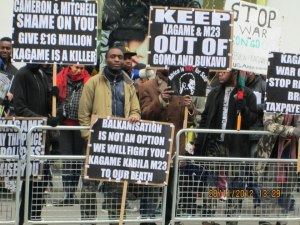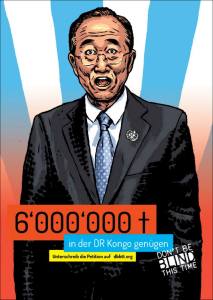In 1994 the world stood by and watched as Rwanda’s descended into genocidal killings for more than 100 days. According to new evidence, the massacres were sparked after Gen. Paul Kagame, then leader of the Rwanda Patriotic Front (RPF) ordered the plane carrying two presidents, including Rwanda’s Juvenal Habyarimana, to be shot down (Please see new BBC documentary “Rwanda’s Untold Story.” http://vimeo.com/107867605 ).
 |
During a protest of mainly Congolese staged on 28.11.12 at the
diplomatic representations of Rwanda and Democratic
Republic of Congo in London days after the rebel group M23
had occupied Goma.
|
Now 21 years later, there is a risk that Rwanda and neighboring Congo can revert to genocidal killings if U.S. envoy to the Great Lakes region, Russ Feingold, does not renounce his support for warfare as the approach to disarm the FDLR militia, which is regarded as threat to regional stability. Many Rwanda experts such as Dr. Theogene Rudasingwa, Rwanda’s former ambassador to the USA, under Gen. Kagame’s regime, reject any new war in the region. He and many others want peace negotiations to continue.
Dr. Rudasingwa believes war only benefits unindicted U.S.-backed war criminal Paul Kagame whose role in igniting the 1994 genocide has now been exposed by the BBC. People who care about global peace and for the lives of innocent Africans, must tell Russ Feingold to support peace negotiations between the FDLR, Gen. Kagame, and other stakeholders in Rwanda, Congo and the region. NO TO ANOTHER WAR THAT CAN SPARK GENOCIDE.
As we start the new year 2015 the drum beats are once again sounding in the Congo — the U.S. must oppose not join this drum beat.
Launching a New War In the Congo is not the best way to neutralize threats from the FDLR.
Former Senator Russ Feingold, now the U.S.’s Special Envoy to the Great Lakes believes the best way to disarm the FDLR, the Rwanda militia accused of human rights abuses in Rwanda and in Congo is through armed intervention.
This is wrong. This approach could escalate the conflict in Central and East Africa and fighting could spiral out of control into genocidal killings.
War is also a gift for the military rulers of Rwanda and Uganda, who have on numerous occasions used troop deployments and regional fighting to deflect attention and focus away from domestic political repression and denial of democracy to the citizens of these two countries.
The proposed Feingold-intervention, whether with MONUSCO, the UN force in Congo, or would the East African Standby force that includes the militaries of Rwanda under brutal dictator Gen. Paul Kagame and Uganda’s under ruthless dictator Gen. Yoweri Museveni, spells grave disaster. Congo conflict will surely invite Rwanda and Uganda destructive mischief.
Rwanda’s and Uganda’s army have already caused genocidal killings inside Congo through their multiple invasions of Congo, during which these armies and the political leadership also plundered billions of dollars of Congo’s resources. In 2005 Uganda was found liable for what amounts to war crimes in the Congo and Congo was awarded $6 billion to $10 billion — Uganda has not paid a dime.
According to an article in The Wall Street Journal on June 8, 2006, the International Criminal Court (ICC) also launched a criminal investigation and Gen. Museveni, possibly fearing indictment, urged then U.N. Secretary General Kofi Annan to block the investigation.
A United Nations investigation known as “The Mapping Report” also found that Rwanda’s army under Gen. Kagame committed genocide against Hutu refugees inside Congo.
Most recently a documentary by the BBC “Rwanda’s Untold Story” tied Gen. Kagame to the assassination of then Rwanda president Juvenal Habyarimana in 1994 by ordering his plan shot down, also killing the president of Burundi who was on the same plane.
A Spanish and French court is also investigating Rwanda’s top military and political leadership, including Gen. Kagame, on the Habyarimana assassination, which sparked the genocide in Rwanda.
In essence, Gen. Museveni and Gen. Kagame are unindicted war criminals who are provided political and diplomatic cover by the U.S. and by the U.K. administrations.
They must not be allowed to launch new wars of aggression against Congo under the guise of disarming the FDLR, which indeed must be disarmed — but not by belligerent countries, Rwanda and Uganda, whose armies have caused untold misery in Congo with an estimated 7 million to 10 million deaths of Congolese.
President Jakaya Kikwete of Tanzania, East Africa’s most stable and politically tolerant democracy –whose presidency has term limits– has called for dialogue between the Kagame regime and the FDLR, to accompany the disarmament. Dr. Theogene Rudasingwa, Rwanda’s former ambassador to the United States, who was once Gen. Kagame’s chief of staff, also argues for such an approach to resolve the conflict.
With his ugly human rights record and ties to the Habyarimana assassination, and his past support of the M23 terrorist army, which had to be defeated by a Special UN Force –and forced President Obama to personally telephone him in Kigali– Gen. Kagame does not have the moral authority to reject negotiations for peace and reconciliation.
U.S. Special Envoy to the Great Lakes, Feingold, must back down from war-mongering as the first option to resolve the crisis. He could help trigger a new round of genocide in the region.
Say “NO” to War In the Congo.
EDITOR’S NOTE
Today we have evidence that US and UK backed the Rwandan president militarily and diplomatically in perpetrating the 1994 genocide which killed around 800,000 Rwandans. During the last 21 years, we are also aware of their backing of Rwanda and Uganda in the Congolese genocide which took more than six million of lives.
Presently they are at it again warmongering, intimidating and harassing SADC countries not ready nor willing to kill innocent Africans. Reuters and other western media of intoxication of public opinion are busy working on making people accept as logical that hutu refugees in Eastern Congo should be massacred as in 1996 and thereafter.
I am inviting all Africans who are not CHARLIE but value first and foremost African lives, plus real friends of the continent across the world, and who have public channels of communication, to post on their different social media platforms and talk widely about these new waves of massacres against our people that UN, UNSC, MONUSCO, Rwanda, Uganda, and other local and global agents of imperialism, are preparing for the Democratic Republic of the CONGO under the pretext of pursuing FDLR.



